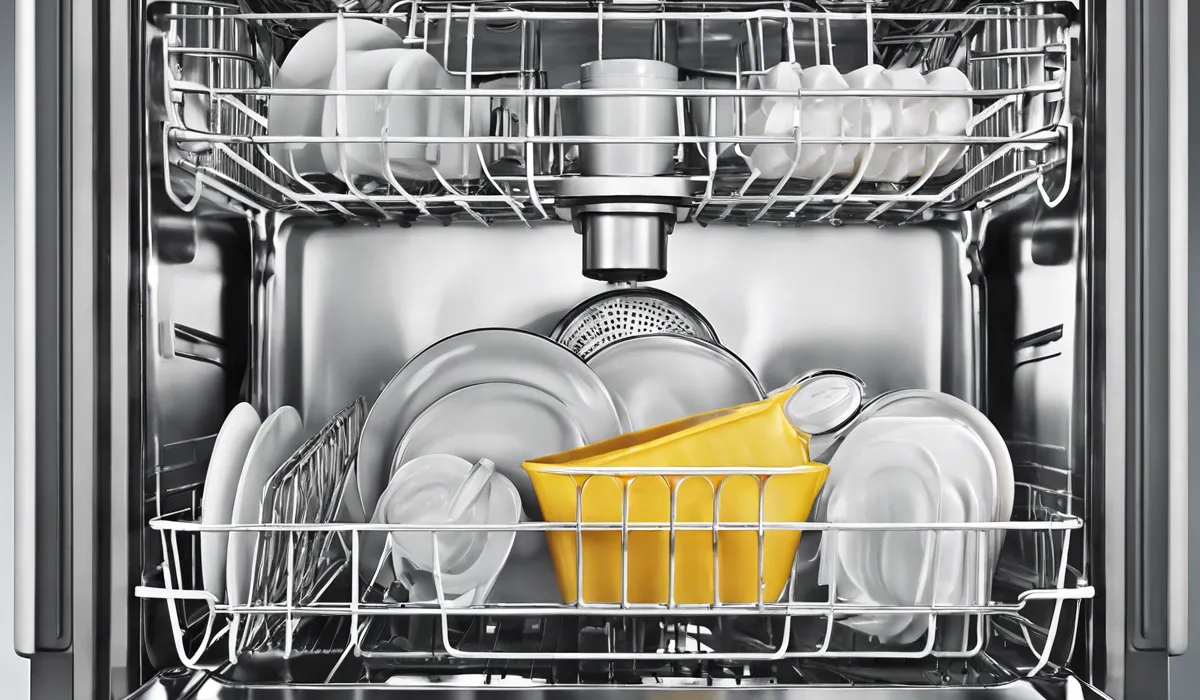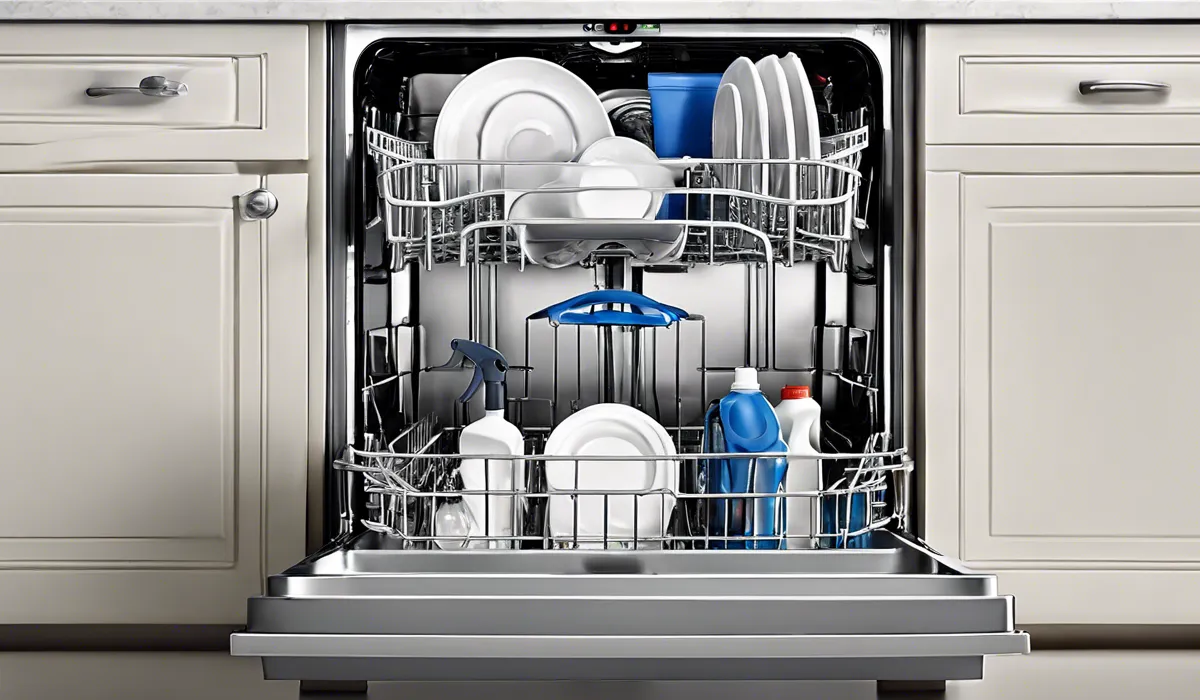What is Dishwasher Detergent: Secrets to Spotless Dishes
Dishwasher detergent is a cleaning formula designed for use in automatic dishwashers. It effectively breaks down food residue and grease, ensuring dishes come out clean. Unlike regular soap, it doesn’t produce suds, which are detrimental to dishwasher function.
Understanding Dishwasher Detergent

Definition of Dishwasher Detergent
Dishwasher detergent is a specially formulated cleaning agent designed for use in automatic dishwashers.
It is engineered to break down and remove food residue, grease, and stains from dishes during the wash cycle, ensuring that they come out sparkling clean.
Unlike traditional dish soap, dishwasher detergent does not create suds, which can interfere with the machine’s operation and effectiveness.
Key Ingredients in Dishwasher Detergent
The potency of dishwasher detergent comes from a combination of ingredients, each with a specific role in the cleaning process. These ingredients work together to tackle various types of food residue and stains.
Enzymes
Enzymes are biological molecules that speed up chemical reactions. In dishwasher detergents, they help break down stubborn food particles like proteins and starches, making them easier to wash away.
Surfactants
Surfactants are the detergents’ cleaning powerhouses. They reduce the surface tension of water, allowing it to spread out and penetrate grime, lifting it from the surface of dishes.
Bleaching Agents
Bleaching agents in dishwasher detergents target and remove color-based stains, such as those from coffee or tea, restoring the brightness of your dishes.
Phosphates and Their Alternatives
Phosphates were once a common ingredient in dishwasher detergents due to their effectiveness in softening water and aiding cleaning.
However, due to environmental concerns, they have been largely phased out and replaced with more eco-friendly alternatives that perform similar functions.
Varieties of Dishwasher Detergent
Dishwasher detergents come in various forms, each with its own advantages and ideal use cases.
Powder Detergents
Powder detergents are a classic choice, known for their cost-effectiveness and the ability to measure out the exact amount needed per wash cycle.
Liquid Detergents
Liquid detergents dissolve quickly and are great for short cycles or low-temperature washes, ensuring no residue is left behind.
Tablets and Pods
Detergent tablets and pods offer convenience with pre-measured doses, reducing waste and ensuring consistent cleaning power for each cycle.
Contrast with Regular Dish Soap
Regular dish soap is designed for manual washing and creates suds that are not only unnecessary but also harmful in a dishwasher.
Dishwasher detergent, conversely, is low-sudsing and formulated to work with the mechanics of an automatic dishwasher, ensuring that dishes come out clean without damaging the machine.
The Role of Dishwasher Detergent in Effective Cleaning

Inside the Dishwasher: The Cleaning Process
The dishwasher cleaning process involves a combination of mechanical action, high temperatures, and the chemical properties of the detergent.
Water is sprayed onto the dishes through rotating arms, while the detergent acts to dissolve and dislodge food particles and stains.
Breaking Down Food and Grease
Dishwasher detergents are specifically formulated to break down various types of food residues and grease. The enzymes, surfactants, and bleaching agents work together to ensure that dishes emerge from the dishwasher free of any leftover food or stains.
Water Temperature’s Role
The effectiveness of a dishwasher detergent is significantly influenced by the water temperature. Hot water enhances the detergent’s capabilities by helping to dissolve and activate cleaning agents, enabling them to better break down food and grease.
Rinse Aids and Their Importance
Rinse aids are used in conjunction with dishwasher detergents to ensure that dishes dry without spots or streaks. They work by altering the surface tension of water, allowing it to flow off dishware more smoothly during the final rinse cycle.
Factors Affecting Detergent Performance
Water Hardness
Water hardness, or the concentration of minerals in the water, can impact the cleaning power of dishwasher detergent. Hard water may necessitate additional detergent or the use of a water softener for optimal results.
Dish Load and Soil Level
The amount and type of dishes, as well as the degree of soiling, will affect how much detergent is needed. Heavily soiled loads may require a higher detergent dosage to achieve the desired cleanliness.
Dosage and Dispensing
Proper detergent dosage and correct use of the dispenser are crucial for the efficiency of the cleaning process. Overuse of detergent can lead to residue on dishes, while underuse may result in insufficient cleaning.
Choosing the Right Dishwasher Detergent

Understanding Cleaning Needs
Types of Dishes and Wash Cycles
When selecting a dishwasher detergent, consider the types of dishes you frequently wash and the regularity of your wash cycles. Certain detergents may be more effective for specific materials or for households that run their dishwasher frequently.
Eco-Friendly and Health Considerations
Environmental Impact
Choosing an environmentally friendly dishwasher detergent can help reduce the impact on ecosystems. Look for detergents with biodegradable ingredients and those free from phosphates and chlorine.
Allergies and Safety
If you or your family members have allergies or sensitivities, opt for fragrance-free or hypoallergenic dishwasher detergents. Additionally, consider child and pet safety by selecting products with secure packaging and storage guidelines.
Cost Effectiveness
Compare the cost and value of different dishwasher detergents. While some may be more expensive upfront, they might offer better cleaning performance or more doses per package, which could save money in the long run.
Optimizing Detergent Use and Maintenance
Pre-Rinsing and Dishwasher Care
To maximize the effectiveness of your dishwasher detergent, pre-rinsing heavily soiled items can be beneficial. Additionally, regular cleaning of the dishwasher filter and seals ensures that the appliance operates at peak efficiency.
Top Dishwasher Detergent Recommendations
After considering all factors, explore recommendations for top-rated dishwasher detergents that match your specific needs and preferences.
Look for products with excellent consumer reviews and those that have been tested and recommended by trusted sources.
FAQs About Dishwasher Detergent
What is the primary purpose of dishwasher detergent?
The primary purpose of dishwasher detergent is to clean dishes within an automatic dishwasher, effectively breaking down food residue and grease without producing suds that could harm the appliance.
Can I use regular soap instead of dishwasher detergent in my dishwasher?
No, regular soap should not be used in a dishwasher as it produces suds that can damage the machine and affect its cleaning efficiency.
What makes dishwasher detergent different from regular dish soap?
Dishwasher detergent is formulated to work in the high-temperature environment of a dishwasher and to not produce suds, unlike regular dish soap which is designed for hand washing and creates suds.
Is dishwasher detergent safe for all types of dishes and utensils?
Most dishwasher detergents are safe for a variety of dishes and utensils, but it’s important to check for any specific manufacturer recommendations, especially for delicate or non-dishwasher safe items.
How do I choose the right dishwasher detergent for my machine?
Choose a dishwasher detergent that is compatible with your dishwasher model and water hardness, and consider factors like cleaning power, environmental impact, and any specific cleaning needs such as removing tough stains or being suitable for sensitive skin.
Final Thoughts
Dishwasher detergent is specifically formulated for use in automatic dishwashers to efficiently dissolve food remnants and grease on dishes.
Its unique composition avoids suds that can impair the appliance’s operation, distinguishing it from regular soaps and making it essential for the maintenance of both dish cleanliness and machine functionality.
Useful Resources
- https://news.wisc.edu/curiosities-whats-the-difference-between-dishwasher-detergent-laundry-detergent-and-dish-soap-why-arent-they-interchangeable/
- https://dec.ny.gov/environmental-protection/water/water-quality/lawn-fertilizer
- https://www.energy.gov/ehss/articles/dishwasher-detergent-brands-meet-doe-fy-2024-priority-products-goals





